- Home
- James Clavell
Escape Page 12
Escape Read online
Page 12
Gueng tossed it aside. The head rolled a little down the slope then stopped. ‘I searched him, sahib, and found this.’ He handed him the amulet. ‘It was around his throat and this’—he gave him the small leather bag—‘this hung down around his balls.’
The amulet was just a cheap blue stone worn against the evil eye. Inside the little bag was a small card, wrapped in plastic. Ross squinted at it and his heart skipped a beat. At that moment there was another keening on the wind, the note different. Immediately they picked up their guns and ran for the cave mouth, knowing that Tenzing had given them the all clear signal and to hurry. Inside the throat of the cavern the darkness seemed deeper and then, as their eyes adjusted, they saw a fleck of light. It was a flashlight, the lens partially covered.
‘Over here, Captain.’ Though it was softly said, Rosemont’s voice echoed loudly. ‘This way.’ He led them farther into the cave and when he was sure it was safe he shone the light on the rock walls and all around to get his bearings. ‘It’s okay to use your flashes.’ The cave was immense, many tunnels and passages leading off it, some natural, some man-made, the rock dome fifty feet overhead. ‘This’s the unloading area,’ he said. When he found the tunnel he sought he shone the light down it. At the end was a thick steel door, half open. ‘It should be locked,’ he whispered, his voice raw. ‘I don’t know if it was left like that or what, but that’s where we have to go.’
Ross motioned to Tenzing. At once the kukri came out and the soldier went forward to vanish inside. Automatically Ross and Gueng took up defensive positions. Against whom? Ross asked himself helplessly, feeling trapped. There could be fifty men hidden in any one of those other tunnels.
The seconds dragged. Again there was the keening. Ross led the rush through the doorway, then Gueng, then Rosemont. As Rosemont passed the door he saw that Tenzing had taken up a position nearby and was covering them. He pulled the door to and switched on the lights. The suddenness made the others gasp.
‘Hallelujah!’ Rosemont said, openly relieved. ‘The brass figured if the generators were still working, we’d have a good shot. This door’s lightproof.’ He slid heavy bolts into place, hung his flashlight on his belt.
They were in another cave, much smaller, that had been adapted, the floor levelled and carpeted roughly, the walls made more flat. It was a form of anteroom with desks and phones and litter everywhere. ‘The guys sure didn’t waste any time getting to hell out, did they?’ he said bitterly, hurrying across the room to another tunnel, down it and into another caveroom with more desks, a few radar screens, and more phones, grey and green.
‘The grey’re internal, greens go to the tower and masts on the crest, from there by satellite to Tehran, our HQ switchboard in the embassy, and various top-secret places—they’ve built-in scramblers.’ Rosemont picked one up. It was dead. ‘Maybe the communications guys did their job after all.’ At the far end of the room was a tunnel. ‘That goes down to the generator room for this section which has all the gear we’ve to blow. Living quarters, kitchens, mess halls, repair shops, are in other caves off the unloading area. About eighty guys worked here around the clock.’
‘Is there any other way out of here?’ Ross asked. His feeling of being closed in was greater than ever.
‘Sure, topside, where we’re going.’
Rough steps led upward through the domed roof. Rosemont started climbing them. On the landing was a door: top security area—no admittance without special authority. It too was open. ‘Shit,’ he muttered. This cave was well appointed, floor flatter, walls whitewashed. Dozens of computers and radar screens, and banked electronic equipment. More desks and chairs and phones, grey and green. And two red on a central desk.
‘What’re those for?’
‘Direct to Langley by military satellite.’ Rosemont picked one up. It was dead. So was the other. He pulled out a piece of paper and checked it, then went over to a bank of switches and turned some on. Another obscenity as a soft hum began, computers started chattering, warming up, and three of the radar screens came to life, the central white trace-line turning, leaving a scatter pattern in its wake. ‘Bastards! Bastards to leave everything like this.’ His finger stabbed at four corner computers. ‘Blow those mothers—they’re the core.’
‘Gueng!’
‘Yes, sahib.’ The Gurkha took off his pack and began to lay out the plastic explosives and detonators.
‘Half-hour fuses?’ Rosemont said.
‘Half-hour fuses it is.’ Ross was staring at one of the screens, fascinated. Northward he could see most of the Caucasus, all of the Caspian, eastward even part of the Black Sea, all with extraordinary clarity. ‘That’s a lot of space to peer into.’
Rosemont went over to its keyboard and turned a switch.
For a moment Ross was dumbfounded. He tore his eyes off the screen. ‘Now I understand why we’re here.’
‘That’s only part.’
‘Christ! Then we’d better get cracking. What about the cave mouth?’
‘We’ve no time to do a decent job—and the other side of our door’s routine junk they’ve stolen anyway. We’ll blow our tunnels after us and use the escapeway.’
‘Where’s that?’
The American went over to a door. This one was locked. He took out a bunch of tagged keys and found the one he wanted. The door swung open. Behind the door a narrow flight of stairs spiralled upward steeply. ‘It leads out on to the mountain.’
‘Tenzing, make sure the way’s clear.’ Tenzing went up the stairs two at a time. ‘Next?’
‘Code room and the safes, we’ll mine those. Then communications. Generator room last, okay?’
‘Yes.’ Ross liked the incisive strength more and more. ‘Before we do you’d better look at this.’ He took out the small, plastic-covered card. ‘Gueng caught up with our guide. This was on him.’
All colour left Rosemont’s face. On the card was a thumbprint, some writing in Russian script and a signature. ‘An ID!’ he burst out. ‘A commie ID!’ Behind them Gueng paused momentarily.
‘That’s what I thought. What’s it say exactly?’
‘I don’t know, I can’t read Russian either but I’ll bet my life it’s a safe-conduct pass.’ A wave of sickness came up from his stomach as he remembered all the days and nights he had spent in the old man’s company, wandering the mountains, sleeping alongside him in the open, feeling very safe. And all the time he’d been pegged. Numbly he shook his head. ‘Meshghi was with us for years—he was one of Ali bin Hassan Karakose’s band—Ali’s an underground leader and one of our best contacts in the mountains. Great guy who even operates as far north as Baku. Jesus, maybe he’s been betrayed.’ He looked at the card again. ‘Just doesn’t figure.’
‘I think it figures we could have been deliberately set up, sitting ducks,’ Ross said. ‘Perhaps the convoy’s part of it, full of troops to track us. We’d better hurry it up, eh?’
Rosemont nodded, fighting to dominate the fear that swept through him, helped by the calmness of the other man. ‘Yes, yes, you’re right.’ Still shattered, he went through a small passage to another door. Locked. As he looked for the key on the tabbed ring of keys he said, ‘I owe you and your men an apology. I don’t know how we—I—got taken in or how that bastard escaped the security check but he did and you’re probably right—we’re set up. Sorry, but, shit, that doesn’t help a goddam bit.’
‘It helps.’ Ross grinned and the fear dropped off both of them. ‘It helps. Okay?’
‘Okay. Thanks, yes, thanks. Gueng killed him?’
‘Well,’ Ross said dryly. ‘He handed me his head. They usually just bring back ears.’
‘Jesus. You been with them long?’
‘The Gurkhas? Four years.’
The key slid into the lock and the door opened. The code room was pedantically neat. Telex and teleprinter and copy machines. A curious computer p
rinter with a keyboard was on its own desk. ‘That’s the decoder—worth any money you’d like to ask the opposition.’ On the desks pencils were lined up. Half a dozen manuals.
Rosemont picked them up. ‘Good sweet Jesus. . .’ All were codebooks marked Mecca—one copy only. ‘Well, at least the master code’s locked up.’ He went to the modern safe with its electronic, 0-9 digital lock that was set into one wall, read the combination from his piece of paper and touched the digits. But the open light didn’t come on. ‘Maybe I missed a number. Read them to me, okay?’
‘Sure.’ Ross began reading out the long series of numbers. Behind them Tenzing came in noiselessly. Neither man heard him. . . then both men felt the presence at the same instant and whirled, momentarily panicked.
Tenzing kept the delight off his face and closed his ears to the profanity. Hadn’t the Sheng’khan told him to train the son and make him wise in the ways of stealth and killing? Hadn’t he sworn to guard him and be his silent teacher? ‘But, Tenzing, for the love of God don’t let my son know I told you to. Keep his secret between us. . ..’ It’s been very hard to catch the sahib unawares for weeks, he thought happily. But Gueng caught him tonight and so did I. Much better we do than an enemy—and now they surround us like bees and their queen.
‘The staircase leads upward for seventy-five steps to an iron door,’ Tenzing said in his best reporting voice. ‘The door is rusty but I forced it. Outside is a cave, outside the cave is the night—a good escape route, sahib. Not good is that from there I saw the first of the convoy.’ He paused, not wanting to be wrong. ‘Perhaps half an hour of time is left.’
‘Go back to the first door, Tenzing, the one we barred. Mine the tunnel this side of the door to leave the door unharmed—twenty-minute fuse from now. Tell Gueng to set his fuses the same from now exactly. Tell Gueng what I’ve ordered.’
‘Yes, sahib.’
Ross turned back. He noticed the sweat on Rosemont’s forehead. ‘Okay?’
‘Sure. We got to 103.’
‘The last two numbers are 660 and 31.’ He saw the American touch the numbers. The Open light began winking. Rosemont’s right hand went for the lever. ‘Hold it!’ Ross wiped the sweat from his own chin, the golden stubble rasping. ‘I suppose there’s no chance it could be booby-trapped?’
Rosemont stared at him, then at the safe. ‘It’s possible. Sure, it’s possible.’
‘Then let’s just blow the bugger and not risk it.’
‘I—I’ve gotta check. I’ve got to check if Mecca’s master code’s inside or not. That and the decoder are priority.’ Again he looked at the light winking at him. ‘You go back in the other room, take cover with Gueng, shout when you’re ready—it’s my shot.’
Ross hesitated. Then he nodded, picked up both packs that contained explosives and detonators. ‘Where’s the communication room?’
‘Next door.’
‘Is—is the generator room important?’
‘No. Just this one, the decoder and those four mothers back there, though it’d be best if this whole goddam floor went to hell.’ Rosemont watched Ross walk away then turned and looked back at the lever. There was a bad tightness in his chest. ‘That sonofabitch Meshghi! I’d’ve bet my life—you ready?’ he called out impatiently.
‘Wait!’ Again his stomach surged. Ross was back beside him before he had heard him, in his hands a long, thin, nylon climbing rope that, quickly, he lashed to the lever. ‘Turn the lever when I say but don’t open the door. We’ll jerk it open from back there.’ Ross hurried out. ‘Now!’
Rosemont took a deep breath to slow his heart and turned the lever to Open then ran through the passage into the other cave. Ross beckoned him down beside the wall. ‘I sent Gueng to warn Tenzing. Ready?’
‘Sure.’
Ross tightened the rope, then tugged hard. The rope remained taut. He tugged even harder, then it slackened a foot but came no farther. Silence. Nothing. Both men were sweating. ‘Well,’ Ross said, greatly relieved, and got up. ‘Better safe than sorr—’ The explosion obliterated his words, a great cloud of dust and bits of metal blew out of the passage into their cave, jerking the air from their lungs, scattering tables and chairs. All radar screens burst, lights vanished, one of the red phones tore loose and hurtled across the room to smash through the steel casing of a computer. Gradually the dust settled, both men coughing their hearts out in the darkness.
Rosemont was the first to recover. His flashlight was still on his belt. He groped for it.
‘Sahib?’ Tenzing called out anxiously, rushing into the room, his flash on, Gueng beside him.
‘I’m all—right,’ Ross said, still coughing badly. Tenzing found him lying in the rubble. A little blood was running down his face but it was only a superficial wound from the flying glass. ‘Bless all gods,’ Tenzing muttered and helped him up.
Ross fought to stay upright. ‘Christalmighty!’ Blankly he looked around at the wreckage, then stumbled after Rosemont through the passage into the code room. The safe had vanished, with it the decoder, manuals, phones, leaving a huge hole in the living rock. All electronic equipment was just a mess of twisted metal and wires. Small fires had already started.
‘Jesus,’ was all Rosemont could say, his voice little more than a croak, his psyche revolted by the nearness to extinction, mind screaming: run, escape this place of your death. . .
‘Christ all bloody mighty!’
Helplessly, Rosemont tried to say something more, couldn’t, his legs took him into a corner and he was violently sick.
‘We’d better—’ Ross found it hard to talk, his ears still ringing, a monstrous ache in his head, adrenalin pumping, trying to dominate his own wish to run. ‘Tenzing, are—are you finished?’
‘Two minutes, sahib.’ The man rushed off.
‘Gueng?’
‘Yes sahib. Two minutes also.’ He hurried away.
Ross went to the other corner and retched. Then he felt better. He found the flask and took a long swig, wiped his mouth on the sleeve of his battle dress, went over and shook Rosemont who was leaning against the wall. ‘Here.’ He gave it to him. ‘You all right?’
‘Yes. Sure.’ Rosemont still felt queasy, but now his mind was working. His mouth tasted foul and he spat the foulness into the rubble. Small fires burned, throwing crazy shadows on the walls and roof. He took a careful sip. After a moment he said, ‘Nothing on God’s earth like Scotch.’ Another sip and he handed the flask back. ‘We’d better get the hell out of here.’
With the flashlight he made a quick search of the wreckage, found the twisted remains of the all-important decoder, and picked his way carefully into the next cave and laid the remains near the charge at the base of the corner computers. ‘What I don’t understand,’ he said helplessly, ‘is why the whole goddam place didn’t go up and blow us all to hell anyway—with all our explosives scattered around.’
‘I—before I came back with the rope and sent Gueng off to Tenzing, I told Gueng to remove the explosives and the detonators for safety.’
‘You always think of everything?’
Ross smiled weakly. ‘All part of the service,’ he said. ‘Communications room?’
It was mined quickly. Rosemont glanced at his watch. ‘Eight minutes to blast-off. We’ll forget the generator room.’
‘Good. Tenzing, you lead.’
They went up the escape staircase. The iron hatch creaked as it opened. Once in the cave Ross took the lead. Cautiously he peered out at the night and all around. The moon was still high. Three or four hundred yards away the lead truck was grinding up the last incline. ‘Which way, Vien?’ he asked and Rosemont felt a glow.
‘Up,’ he said, hiding the warmth. ‘We climb. If there’re troops after us, we forget the coast and head for Tabriz. If no troops we circle and go back the way we came.’
Tenzing led. He was like a mountain goat but
he picked the easiest path, knowing the two men were still very shaky. Here the slope was steep but not too difficult with little snow to impede them. They had barely started when the ground shook beneath them, the sound of the first explosion almost totally muffled. In quick succession there were other small quakes.
One to go, Rosemont thought, glad of the cold which was clearing his head. The last explosion—the communications room—where they had used all their remaining explosive was much bigger and really shuddered the earth. Below and to their right, part of the mountain gave way, smoke billowing out of the resulting crater.
‘Christ,’ Ross muttered.
‘Probably an air vent.’
‘Sahib. Look down there!’
The lead truck had stopped at the entrance to the cave. Men were jumping out of it, others staring up at the mountainside, illuminated by the lights of the following trucks. The men all had rifles.
Ross and the others slid deeper into the shadows. ‘We’ll climb up to that ridge,’ Rosemont said softly, pointing above and to their left. ‘We’ll be out of their sight and covered. Then we head for Tabriz, almost due east. Okay?’
‘Tenzing, on you go!’
‘Yes, sahib.’
They made the ridge and hurried over it to climb again, working their way eastward, not talking, conserving their energy for there were many, many miles to go. The terrain was rough and the snow harried them. Soon their gloves were torn, hands and legs bruised, calves aching but, no longer encumbered by heavy packs, they made good progress and their spirits were high.
They came to one of the paths that crisscrossed the mountains. Whenever the path forked, their choice was always to keep to the heights. There were villages in the valley, very few up this high. ‘Better we stay up here,’ Rosemont said, ‘and. . . and hope we don’t run into anyone.’
‘You think they’ll all be hostile?’
‘Sure. It’s not only anti-Shah country here but anti-Khomeini, anti-everyone.’ Rosemont was breathing heavily. ‘It’s village against village most of the time and good bandit country.’ He waved Tenzing onward, thankful for the moonlight and that he was with the three of them.

 Gai-Jin
Gai-Jin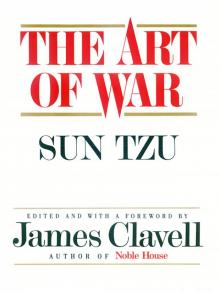 The Art of War
The Art of War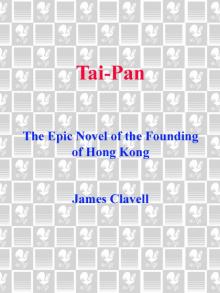 Tai-Pan
Tai-Pan Noble House
Noble House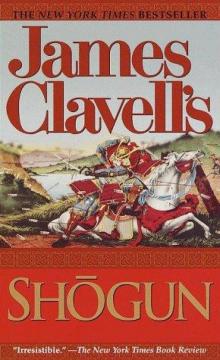 Shōgun
Shōgun Whirlwind
Whirlwind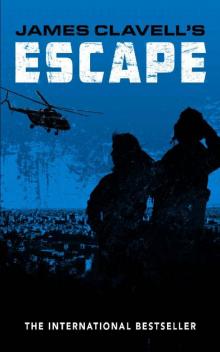 Escape
Escape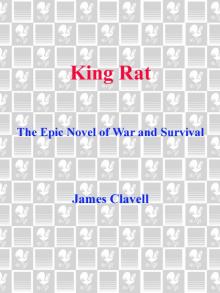 King Rat
King Rat The Children's Story
The Children's Story